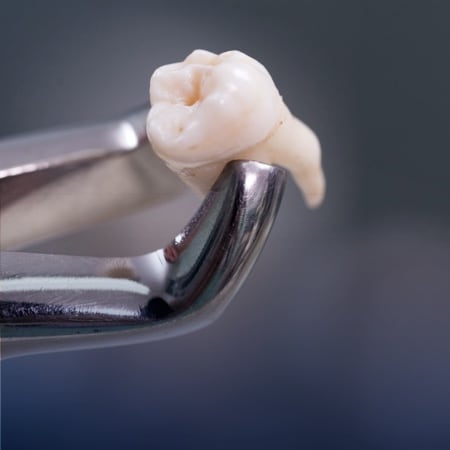Missing teeth not only affect your appearance but also your oral health, including your ability to chew and speak. When it comes to replacing missing teeth, common and effective solutions are dental implants and dentures.
Each option has its benefits and is suitable for different needs. Choosing the right one depends on factors like which teeth are missing, your oral and overall health, your lifestyle, and the structure of your jaw.
What Are Dental Implants?
Dental implants are a highly effective, long-term solution for replacing missing teeth.
A dental implant consists of a titanium post that is surgically placed into the jawbone, serving as a stable foundation for a custom-made artificial tooth. This process provides a secure, reliable replacement that closely mimics the look and function of a natural tooth.
Advantages of Dental Implants
- Durability: With regular care and maintenance, dental implants can last for years or even a lifetime, making them a long-term solution.
- Natural appearance: Implants are designed to match the shape, size, and colour of your natural teeth, creating a seamless blend between old and new teeth.
- Jawbone stimulation: Unlike other tooth replacement options, implants stimulate the jawbone, preventing bone loss and maintaining the structure of your face.
The Dental Implant Process
The dental implant process begins with a comprehensive consultation. During this consultation, your oral health is assessed to determine if dental implants are right for you. This evaluation typically includes X-rays and a thorough examination of your gums and jawbone.
The next step involves surgically placing the titanium implant into your jawbone under local anesthesia. The implant serves as a secure foundation for the replacement tooth.
Over the next 3 to 9 months, the implant undergoes osseointegration, which fuses with the jawbone to form a stable base, similar to a natural tooth root. After healing, a connector piece (abutment) is attached, followed by a custom crown designed to match your natural teeth, completing the restoration of your smile.
What Are Dentures?
Dentures are removable appliances designed to replace missing teeth. They offer a noninvasive solution for tooth loss and help restore both the function and appearance of your smile. Dentures are made from durable acrylic resin and are crafted to provide a natural look.
A range of options are available, including partial dentures, full dentures, and implant-supported dentures.
The Advantages of Dentures
- Accessibility: Dentures are an accessible option for a wide range of patients, providing a reliable solution for those who need to replace missing teeth.
- Noninvasive option: Getting dentures is straightforward and typically involves taking noninvasive impressions of your gums to create a custom fit.
- Simple maintenance: Dentures are easy to care for with simple daily cleaning. They must be removed and cleaned regularly to maintain their appearance and support oral hygiene.
The Process of Getting Dentures
The process of getting dentures involves several stages to ensure they are comfortable, functional, and tailored to your needs.
During your initial consultation, your oral health will be evaluated, and your options will be discussed. This is an opportunity to ask questions about the process or the types of dentures available.
The next steps are straightforward:
- Making impressions: Custom impressions of your mouth will be taken to create a precise mould for your dentures, ensuring a comfortable and natural fit.
- Fittings and adjustments: Once your dentures are ready, fitting appointments will be scheduled to fine-tune the fit and ensure they function correctly. Your dental team will make any necessary adjustments to minimize discomfort or irritation.
Types of Dentures
Several types of dentures are available to address different needs:
- Partial dentures: Designed to fill gaps when some natural teeth remain, partial dentures help prevent remaining teeth from shifting while restoring your smile.
- Full dentures: Designed to replace all teeth in the upper or lower jaws, full dentures are a reliable option for those needing all their teeth replaced.
- Implant-supported dentures: This option integrates dental implants with dentures, securing the denture to implants placed in your jawbone. Implant-supported dentures provide added stability, reduced slipping, and improved comfort and functionality.

What to Keep in Mind
Choosing between dental implants or other restorative options is a highly individual decision, influenced by your specific oral health needs, lifestyle, and goals. Since every case is unique, it’s important to consult with a dental professional to explore the best solution for you.
Age, Oral Health, & Lifestyle
Younger patients with healthy bone density may benefit from dental implants, which offer a long-term, stable solution. However, patients with weakened bone structures may require bone grafting or pre-prosthetic surgery to ensure a strong foundation for implants.
Comfort & Maintenance
Dental implants provide a long-lasting, low-maintenance solution that functions like natural teeth. These options do not require removal or frequent adjustments, offering improved convenience and comfort.
Personalized Options
Depending on your oral health and preferences, your oral surgeon can recommend the most appropriate restorative treatment—whether dental implants or other specialized procedures.
Discover Which Dental Treatment Is Right for You
Choosing between dental implants and dentures is a big decision that can directly impact your quality of life. Ultimately, neither option is inherently “better”—it comes down to your individual circumstances. Regardless of your choice, your decision should be based on your oral health, lifestyle, and preferences.For personalized recommendations based on your unique needs, our dental professionals at CVOS Oral Surgery are here to assist and guide you. Begin your journey towards reclaiming your smile by contacting us today.










